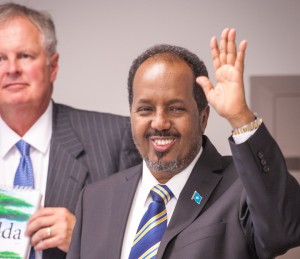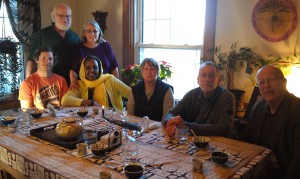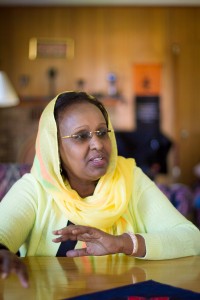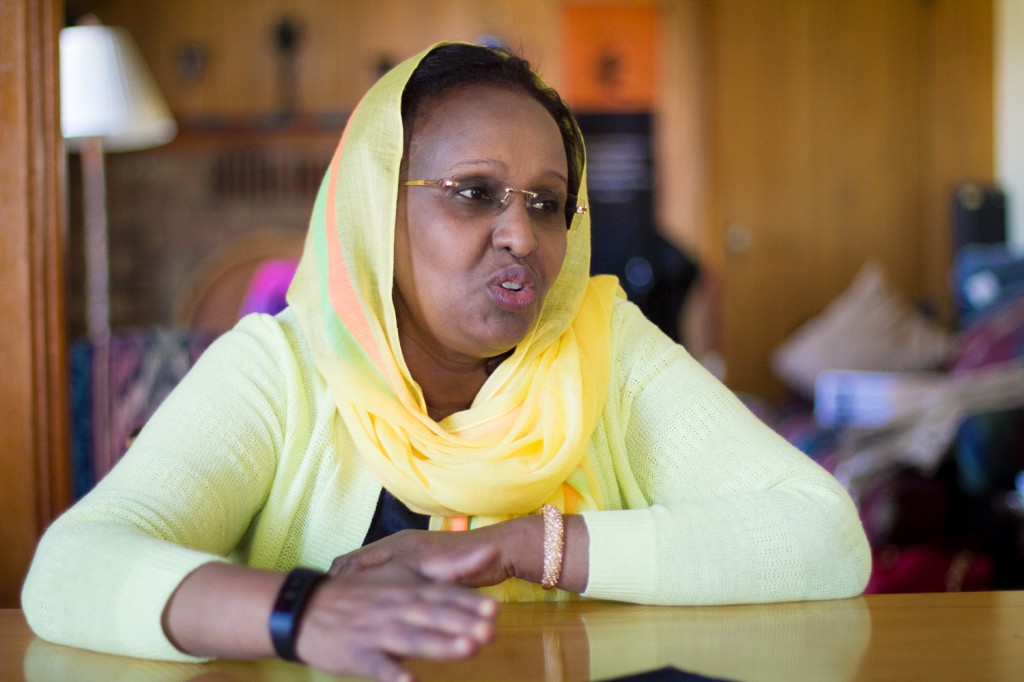The trail of the president of Somalia to Eastern Mennonite University goes back 14 years to Khadija Ossoble Ali.
In 2000, when Ali was a graduate student in conflict transformation at EMU’s Center for Justice and Peacebuilding, she encouraged a family friend, now-president Hassan Sheikh Mohamud, to take courses on building peace at EMU.
Mohamud came in 2001, the year Ali completed her master’s degree, and took three intensive courses in the Summer Peacebuilding Institute (SPI). Another Somali woman took SPI classes that year, Hawa Moallim. Ali, Mohamud and Moallim returned to their home country eager to apply what they had learned.

Somalia had been devastated by decades of violent conflict and lacked a functioning government. The three Somalis trained at EMU yearned to nurture peace among their fellow Muslims, usually affiliated with clan fiefdoms that squabbled among themselves, sometimes to the point of killing. (Five more Somalis have done graduate study at EMU’s Center for Justice and Peacebuilding since 2001.)
Ali’s life since the early 2000s has alternated between highly visible public service and further graduate study. She served in Somalia’s parliament and in the prime minister’s cabinet in 2001-02. She left Somalia when radically strident Muslim clerics gained ascendancy in the mid-2000s and headed back to Virginia, where she earned a PhD in conflict analysis and resolution from George Mason University in 2014. Yet each summer, except for 2007, she spent an extended period in Somalia. From 2007 to 2010, she was the senior advisor on reconciliation to the previous president.
Much need for peacebuilding in Somalia
Ali is now back in East Africa – permanently, she thinks – ready to put her experience and knowledge into practice where much of her family lives and “where the need is so great.” Her return has been welcomed by President Hassan Sheikh Mohamud. She is married to a Somali engineer, who is happy for her to realize her potential and lead as a woman in a male-dominated society. They have a 20-year-old daughter who is a student at Georgetown University’s School of Foreign Service in Qatar.

But before Ali headed home this time, she paid a one-day visit to long-time friends Earl and Pat Hostetter Martin, who live almost adjacent to EMU. Pat is a former SPI administrator. The Martins invited a couple of her former EMU professors, Howard Zehr and Vernon Jantzi, to reconnect with her over a meal at their home. That day Ali reflected on her path to, through, and beyond EMU, often in response to questions from an EMU news writer who was present.
In the late 1990s, Ali recalled, she was the head of an NGO in Somalia, offering humanitarian assistance. “I was dealing with emergencies all the time – everything was destroyed. If a [water] canal was dug, it was destroyed.”
She kept telling herself, “We have to deal with the root causes of this – we can’t just deal with the symptoms.” But how?
She went to a workshop in South Africa, learned about a peacekeeping studies program in England, and got accepted into it.
Vernon Jantzi impressed her
She deviated from this plan when she heard Jantzi, foundational author of the curriculum of CJP’s master’s program, speak at a UNESCO conference in Nairobi. She sought him out and liked what he said so much, she came to EMU, becoming one of the first 50 master’s degree graduates from CJP.
Ali already had a favorable impression of Mennonites from seeing some in action in Somalia as educators and healthcare workers. “Where I come from, community is very important. I’m glad I came here first [prior to state-run George Mason University], because here you know everybody. There [at GMU] it is big, and you can easily get lost.”
Ali was raised in a religious family, where her grandfather, father and four brothers knew the Qur’an by heart and were sent to school. Her mother, however, was not given an education. As Ali grew to maturity, her mom decided to keep the tradition and only send her brothers to school. Ali was mainly expected to help cook and clean, key skills she would need when she married and had children. One day, though, Ali recalls that an aunt visited and persuaded Ali’s mother to let her attend school.

Ali now asserts, “In any crisis situation, I think women are more skillful. When men can’t talk, women talk. They are better at facilitating dialogue.”
Challenged as a woman
Unfortunately, she adds, “Women [in the Somali culture] are not very aggressive or supportive of each other in leadership roles. The people against me [when she was in politics] were mostly women.” Ali says she hopes to see the day when a woman is president or prime minister of Somalia.
Ali aspires to start a professional training center for peacebuilders in Mogadishu – preferably in collaboration with CJP. She dreads, however, trying to attract funding for such an endeavor. “I don’t like the politics of donors, especially the money from [foreign] governments, which always has political strings attached.”
To achieve peace in Somalia, Ali feels that great effort must be made – and patiently sustained – to “engage everybody and not alienate or exclude any group.”
Is engagement and inclusion possible with Al-Shabaab? This is a group that has played a viciously destabilizing role in Somalia, and indeed the entire region, through its terrorist tactics, including repeated attempts to assassinate President Mohamud. “I’m not sure the best approach to them,” Ali admitted, “but I know reconciliation is always the best option.”
When Mohamud was at EMU, he said he had recently met with Ali in Somalia where they spoke of new national-level responsibilities for her; he conveyed her personal greetings to her alma mater. He also commended CJP’s Women’s Peacebuilding Leadership Program, which has 16 Somali-speaking women as graduates or current students: “You educate a woman, you educate a family. You educate a family, you educate a whole nation.”
